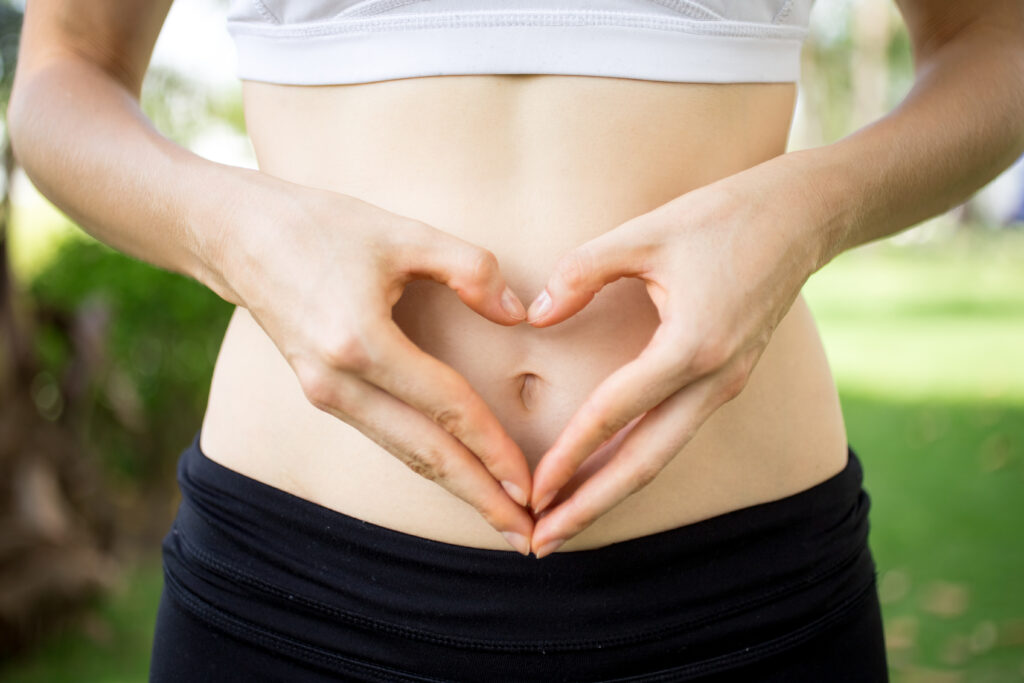Scientists have discovered a correlation between the gut and the brain. Similar to the brain, the gut contains nerves known as the enteric nervous system (ENS), i.e., the second brain.
This clearly shows how intimately our brain and gut are related. The link between the gut and the brain influences digestion, mood, and cognitive processes.

Close-up of female hands shaping heart on belly outdoors. Fitness and dieting concept
www.freepik.com
So, if you want to improve your gut health and brain health, you need to eat the right foods, keep your stress levels low and get plenty of sleep. Apart from that, you need to indulge in physical activities as well.
To learn more about improving your gut health and brain function, continue reading.
The Gut-Brain Connection
Your digestive tract and brain are intertwined through what’s known as the “gut-brain axis.” Neuronal pathways between these organs work both ways, meaning any issues with either can impact how you think.
The gut-brain axis consists of a complex network of nerves that control digestion, mood, and thought processes. The enteric nervous system (ENS), for instance, covers over 100 million nerve cells along your digestive tract’s wall to assist digestion; its “second brain” controls blood flow and secretions to ensure you digest food easily.
Your ENS also sends signals to your brain regarding feelings and emotions, as well as visceral sensations from the gut, through your vagus nerve to your brain. An effective gut microbiome is key for improving the gut-brain connection and avoiding mental health issues like depression, anxiety, and stress.
Brain and gut communication is a fascinating two-way dialogue involving our nervous systems, immune systems, and chemical messengers known as neurotransmitters. This interaction is linked to many behaviors, including anxiety and depression.
Biochemically speaking, gut microbes exert their influence over our brain by producing hundreds of neurochemicals that regulate physical and mental processes – such as serotonin. This chemical helps us manage our moods and sleep cycles more easily.
How to Improve Your Gut Health and Mental Health?
Gut health improvement has been shown to positively influence mood and anxiety symptoms in some cases. By improving your gut health, you can naturally heal your brain. Here are some tips to improve your gut health and mental health.
Effectively Digest Your Food
Effective digestion is essential to overall health and mental well-being. Digestion involves breaking down food to help your body absorb vitamins, minerals, and other essential nutrients more readily. Simple changes to your diet and lifestyle can speed up digestion, such as eating more whole foods, avoiding processed products, and drinking plenty of water. Improved digestion is necessary to support a healthy body and brain.
Mind What And How You Eat
Your gut and your brain have an intimate connection, and this can have a dramatic impact on your mental state. Your stomach is sensitive to emotions such as anger, sadness, and joy and responds accordingly – even producing butterflies in your tummy if you get nervous. By eating more whole foods such as vegetables, fruits, beans, and legumes, you can enhance the health of your gut and promote healthy brain function.
Exercise
Exercise can go a long way toward helping improve both your gut health and mental well-being. Just 30 minutes of moderate physical activity five times each week will reap many rewards both for you and your microbiome. Aerobic activity such as running or brisk walking has been found to increase butyrate-producing bacteria abundance within your colon. Exercise can also help to reduce your stress levels and boost serotonin production.
Drink Plenty of Water
Staying hydrated daily is essential to overall good health, boosting digestion while flushing out toxins through urine output and perspiration. If you want to keep your gut healthy, drink 6 to 8 glasses of water per day. It will help you to avoid problems like gas and constipation and ensure smooth digestion, thereby improving your mental health as well.
Seek Help
Have you experienced stomach-churning feelings like feeling queasy before an interview or getting butterflies while giving a speech? These sensations serve as a reminder that the connection between your GI tract and the central nervous system (CNS) is intrinsic, working together to regulate emotions. If you are suffering from mental health problems like anxiety and depression due to poor gut health, seek help from a professional therapist and dietician.
Foods That Can Help to Improve Your Gut Health and Mental Health
What you eat can have an incredible effect on your health and well-being, particularly if you have a history of depression or anxiety. By making changes to your diet, you can not only boost your gut health but also improve your mental health as well.
Fiber
Eating a high-fiber diet can help to enhance your gut and mental health. It can reduce stress levels while improving moods and serotonin production and delaying brain aging. A diet rich in fiber should include whole grains, fruits, and vegetables to provide your body with adequate amounts. Fiber also plays an essential role in maintaining optimal digestive health while lowering risk factors such as heart disease, diabetes, weight gain, and other chronic illnesses.
Vitamin D
Vitamin D, commonly referred to as “the sunshine vitamin,” is essential for gut health and mental well-being and helps support an efficient immune system. Studies have demonstrated that people suffering from anxiety or depression may be deficient in vitamin D. It may be due to decreased sun exposure or failure to consume foods containing this essential nutrient.
Protein
Protein is an integral component of your diet. It helps to regulate blood sugar levels, combat mood highs, and lows, increase serotonin production. They even promote the healing of any wounds in the body. Protein comes in the form of amino acids. These can be found in foods like chicken, beef, fish, eggs, dairy products, and legumes such as peas and beans. Amino acids form the building blocks for proteins in our bodies. You must consume them regularly in order to remain functional.
Omega-3s
Fatty fish is an excellent source of omega-3s, and you should strive to consume at least two servings each week. Foods containing fatty acids typically contain either eicosapentaenoic acid (EPA) or docosahexaenoic acid (DHA), with the latter known for providing cardiovascular and neurological health benefits. Omega 3, in particular, has been linked with improved gut and brain functions.
Conclusion
Your digestive system consists of hundreds of millions of neurons which make up the Enteric Nervous System (ENS). This network communicates changes within the digestive tract with your brain via the Vagus Nerve. It allows our bodies to regulate hunger, appetite, and digestion accordingly. As your gut and brain are directly connected, improving your gut health result in a healthier brain. By eating the right foods and boosting your gut health through exercise, you can improve your mental health. Moreover, reduce stress levels and improve cognitive function.






Leave a Reply